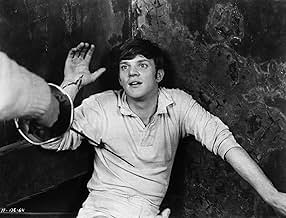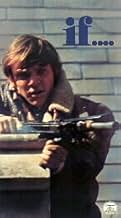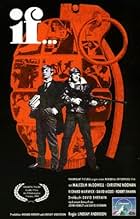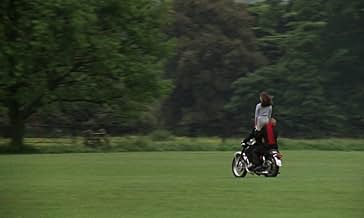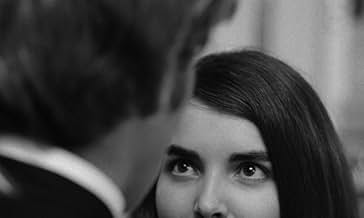CALIFICACIÓN DE IMDb
7.4/10
26 k
TU CALIFICACIÓN
Los estudiantes de un internado británico deciden sublevarse y poner a su represiva escuela patas arriba.Los estudiantes de un internado británico deciden sublevarse y poner a su represiva escuela patas arriba.Los estudiantes de un internado británico deciden sublevarse y poner a su represiva escuela patas arriba.
- Dirección
- Guionistas
- Elenco
- Nominada a2premios BAFTA
- 2 premios ganados y 4 nominaciones en total
Mary MacLeod
- Mrs. Kemp - Staff
- (as Mary Macleod)
Opiniones destacadas
The first entry to the Mick Travis trilogy ("If...", 1968, O Lucky Man, 1973, and "Britannia Hospital", 1982), "If.." is a surreal black comedy about an English private boys' school and a student rebellion. In his three films, Anderson had covered all aspects, politics, and institutions of British Society from 1968 to 1982 with its complex system of class differences and privileges. "If..." which was released in 1968 at the peak of youthful rebellion in Europe and USA, received BAFTA and Golden Globe nominations and won the Golden Palm at the Cannes Film Festival where it competed with 27 films from all over the world.
Anderson was in part inspired by Jean Vigo's 41 minutes long "Zero for conduct" (1933) about the similar to "If..." subject. Like in Vigo's film, Anderson inserts some surrealistic episodes shot in black-and-white and according to him, it was driven by budget rather than style. Malcolm McDowell in his first big screen role and the first of three Mick Travis' movies is a charismatic leader of the rebel students who call themselves the Crusaders and like to break the rules. The cruel corporal punishments from the faculty and the older students provoked a bloody uprising against the school system.
Made almost 40 years ago, "If.." still has a power to shock as well as to entertain and it remains an outstanding and controversial depiction of the problems that have not disappear from the English public school system or from any school system as well as from society in general.
I am sure that Stanley Kubrick saw "If..." and was impressed by McDowell's debut performance, by his charisma that shines through his close-ups and especially in the final shot of "If...", and by his face that strangely combines innocence and youthful openness with cynical scornful almost reptilian contempt for humanity. I believe that "If..." was the reason Kubrick offered the part of charming psychopath Alex to the young actor.
Anderson was in part inspired by Jean Vigo's 41 minutes long "Zero for conduct" (1933) about the similar to "If..." subject. Like in Vigo's film, Anderson inserts some surrealistic episodes shot in black-and-white and according to him, it was driven by budget rather than style. Malcolm McDowell in his first big screen role and the first of three Mick Travis' movies is a charismatic leader of the rebel students who call themselves the Crusaders and like to break the rules. The cruel corporal punishments from the faculty and the older students provoked a bloody uprising against the school system.
Made almost 40 years ago, "If.." still has a power to shock as well as to entertain and it remains an outstanding and controversial depiction of the problems that have not disappear from the English public school system or from any school system as well as from society in general.
I am sure that Stanley Kubrick saw "If..." and was impressed by McDowell's debut performance, by his charisma that shines through his close-ups and especially in the final shot of "If...", and by his face that strangely combines innocence and youthful openness with cynical scornful almost reptilian contempt for humanity. I believe that "If..." was the reason Kubrick offered the part of charming psychopath Alex to the young actor.
Lindsay Anderson's 1968 film If... is a beautiful film with a simple message, yet the director's touch and the performances take it to entirely different level.
If... takes place in all boys boarding school and stars Malcolm McDowell as
"Mick" (McDowell in his first screen role). Mick and his two friends feel
somewhat distant from their peers, school, and society. Their general attitude towards such things as sex, war, and authority could be call revolutionary. With surrealistic touches such as unexplained occurrences and changing between
color and black and white. Lindsay Anderson paints a vivid picture of "teenage alienation" before there was a term for such a thing. McDowell would later reprise his role of "Mick" in two other Anderson pictures O' Lucky Man and Britannia Hospital. A must see for fans of McDowell. Just a great film with a message that sparks positive, pro-active thinking. An important film that makes you remember to question authority instead complying to it rules. Sadly If... is not available on DVD at this time.
If... takes place in all boys boarding school and stars Malcolm McDowell as
"Mick" (McDowell in his first screen role). Mick and his two friends feel
somewhat distant from their peers, school, and society. Their general attitude towards such things as sex, war, and authority could be call revolutionary. With surrealistic touches such as unexplained occurrences and changing between
color and black and white. Lindsay Anderson paints a vivid picture of "teenage alienation" before there was a term for such a thing. McDowell would later reprise his role of "Mick" in two other Anderson pictures O' Lucky Man and Britannia Hospital. A must see for fans of McDowell. Just a great film with a message that sparks positive, pro-active thinking. An important film that makes you remember to question authority instead complying to it rules. Sadly If... is not available on DVD at this time.
My word!
"If.." has always been a firm favourite of mine, particularly as I have been in much the same situation (minus B+W/Colour changes, and gun battles, naturally), and indeed still consider myself a hair rebel. It captures perfectly the horrors of public shool-The fawning, smarmy head-master, the rigors of cadet training and founder's day, it's all drawn from horrible reality.
Saw a late night showing yesterday, and on the cinema screen the fabulous direction and power of the photography- so still and unobtrusive, yet so iconic-becomes apparent. That final looped shot of Mick firing the brenn Gun is just stunning! I left the cinema feeling so goddamn moved!
At times the sheer 60s-ness, and random dialogue ("I like Johnny") can seem to undermine the viewing experience, but the spirit of bold rebellion which saturates this marvelous film wins you over. A favourite joke which I had never spotted before, is near the start, where the whips tick off a list that goes something like "Measles, tape worm, conformation class"..marvellous..
GO SEE!!
"If.." has always been a firm favourite of mine, particularly as I have been in much the same situation (minus B+W/Colour changes, and gun battles, naturally), and indeed still consider myself a hair rebel. It captures perfectly the horrors of public shool-The fawning, smarmy head-master, the rigors of cadet training and founder's day, it's all drawn from horrible reality.
Saw a late night showing yesterday, and on the cinema screen the fabulous direction and power of the photography- so still and unobtrusive, yet so iconic-becomes apparent. That final looped shot of Mick firing the brenn Gun is just stunning! I left the cinema feeling so goddamn moved!
At times the sheer 60s-ness, and random dialogue ("I like Johnny") can seem to undermine the viewing experience, but the spirit of bold rebellion which saturates this marvelous film wins you over. A favourite joke which I had never spotted before, is near the start, where the whips tick off a list that goes something like "Measles, tape worm, conformation class"..marvellous..
GO SEE!!
Lindsay Anderson's "If...." begins rather slow, establishing itself as a typical boarding school drama, as students arrive and get into routine at a 500-year-old public school in Britain. In the second half, though, the film takes a turn for the surreal, becoming a dreamlike dark comedy with cultural relevance and artistic wonder.
Watching "If...'s" first few scenes, we expect that the main character will be a first-year student at the school who adapts to the institution's rigorous standards and social hierarchies. However, it slowly becomes apparent that our protagonist is actually an upperclassman named Mick Travis (Malcolm McDowell).
With his two loyal friends Johnny (David Wood) and Wallace (Richard Warwick), Mick refuses to conform to the school's conservative agenda. Late in their academic career, the trio decides to give into their rebellious desires, relishing in rule breaking and defying the school's snootier patrons.
The film is thus a commentary on 1960s British counterculture just as much as it itself is a product of that revolution. Mick, Johnny, and Wallace reflect the time's rebellious youth as the rock-n-roll generation turning against society's archaic norms. Meanwhile, the movie partakes in the same counterculture as a piece of subversive art. The surrealist sequences, experimental editing, sexual undertones, and nudity all go against traditional British cinema to offer something novel, and perhaps even appalling for the formalists.
One of the most blatantly defiant methods that Lindsay Anderson endorses is the use of both black-and-white and color film in the same movie. Timing and lighting restraints initially forced Anderson to use black-and-white when filming in the school's chapel. Allegedly, he liked the effect so much that he decided to shoot additional scenes in the outmoded style. There's no telling why Anderson chose certain scenes for color and others for black-and-white, but the nonconformist blend aids the movie's dreaminess. The audience wonders what is real and what is depraved fantasy.
Malcolm McDowell certainly stands out for his performance as Mick. In fact, McDowell is so convincing as a rebel that this performance led to Stanley Kubrick casting him as the lead in "A Clockwork Orange." McDowell also reprised Mick in two additional Anderson films: 1973's "O Lucky Man!" and 1982's "Britannia Hospital." The character has been hailed as an "everyman," and he certainly has our attention, empathy, and support all throughout "If...."
An unfortunate outcome of that support, however, comes at the film's ending. The finale is climactic and in an odd way satisfying, but has aged horrendously. Without giving too much away, I will say that the denouement involves Mick, his friends, the school, and some guns. In the current age, it is hard to cheer the characters on through such a conclusion, given the real-world relevance of gun violence in schools.
None of this is to say that Anderson is at fault for finishing the movie in this way. In 1968, he could not have imagined the weight this ending might someday carry. Also, the conclusion is not necessarily inappropriate watching it today, but it is definitely darker. We can no longer champion Mick's rebellion in its entirety, but must come to terms with its limits and morality after the screen goes black.
Regardless of the lens we see it through, "If...." is an overlooked movie in British (film) history. While it might retain interest from scholars and critics, the general public - at least in America - has sadly forgotten it. Such is a shame, for it is a brilliant piece of cinema that acutely captures the light and dark sides of a pivotal transition in modern Western civilization.
Watching "If...'s" first few scenes, we expect that the main character will be a first-year student at the school who adapts to the institution's rigorous standards and social hierarchies. However, it slowly becomes apparent that our protagonist is actually an upperclassman named Mick Travis (Malcolm McDowell).
With his two loyal friends Johnny (David Wood) and Wallace (Richard Warwick), Mick refuses to conform to the school's conservative agenda. Late in their academic career, the trio decides to give into their rebellious desires, relishing in rule breaking and defying the school's snootier patrons.
The film is thus a commentary on 1960s British counterculture just as much as it itself is a product of that revolution. Mick, Johnny, and Wallace reflect the time's rebellious youth as the rock-n-roll generation turning against society's archaic norms. Meanwhile, the movie partakes in the same counterculture as a piece of subversive art. The surrealist sequences, experimental editing, sexual undertones, and nudity all go against traditional British cinema to offer something novel, and perhaps even appalling for the formalists.
One of the most blatantly defiant methods that Lindsay Anderson endorses is the use of both black-and-white and color film in the same movie. Timing and lighting restraints initially forced Anderson to use black-and-white when filming in the school's chapel. Allegedly, he liked the effect so much that he decided to shoot additional scenes in the outmoded style. There's no telling why Anderson chose certain scenes for color and others for black-and-white, but the nonconformist blend aids the movie's dreaminess. The audience wonders what is real and what is depraved fantasy.
Malcolm McDowell certainly stands out for his performance as Mick. In fact, McDowell is so convincing as a rebel that this performance led to Stanley Kubrick casting him as the lead in "A Clockwork Orange." McDowell also reprised Mick in two additional Anderson films: 1973's "O Lucky Man!" and 1982's "Britannia Hospital." The character has been hailed as an "everyman," and he certainly has our attention, empathy, and support all throughout "If...."
An unfortunate outcome of that support, however, comes at the film's ending. The finale is climactic and in an odd way satisfying, but has aged horrendously. Without giving too much away, I will say that the denouement involves Mick, his friends, the school, and some guns. In the current age, it is hard to cheer the characters on through such a conclusion, given the real-world relevance of gun violence in schools.
None of this is to say that Anderson is at fault for finishing the movie in this way. In 1968, he could not have imagined the weight this ending might someday carry. Also, the conclusion is not necessarily inappropriate watching it today, but it is definitely darker. We can no longer champion Mick's rebellion in its entirety, but must come to terms with its limits and morality after the screen goes black.
Regardless of the lens we see it through, "If...." is an overlooked movie in British (film) history. While it might retain interest from scholars and critics, the general public - at least in America - has sadly forgotten it. Such is a shame, for it is a brilliant piece of cinema that acutely captures the light and dark sides of a pivotal transition in modern Western civilization.
'If...' is a fascinating and powerful film set in an oppressive and archaic public (that's private to us non-Brits) school. It is one of the most original and innovative of all British movies of the 60s, a decade which began in some ways with 'Peeping Tom' and ended with 'Performance', two much maligned movies which in hindsight are astonishing achievements. 'If..' is equally as striking (and disturbing) as those two criminally underrated movies, but in contrast actually achieved quite a level of popularity on its original release. Even so I don't believe the movie gets the attention it deserves. Hopefully it will be rediscovered by a new generation of movie lovers as it is still very relevant and powerful even now, thirty five years later. Malcolm McDowell (his film debut) stars as the ring-leader of a small group of dissatisfied students who don't fit in with their ultra-conformist contemporaries. His performance is first rate, and in several scenes you can almost see Alex, his droog to be ('A Clockwork Orange'). The movie mixes documentary like realism with fantasy sequences involving "The Girl" (Christine Noonan), and eventually violent rebellion. A movie very much of its time it still is very watchable today and has lost little of its power and ability to surprise. Lindsay Anderson, arguably Britain's most underrated director, continued to expand upon McDowell's Mick Travis character in two subsequent movies, but 'If..' has a very different feel from those "sequels", if they can truly be termed that, and can be watched as a stand alone movie. I was impressed with this movie when I first saw it on black and white TV as a young lad, and I was still impressed when I watched it again the other week. And I will guarantee it will not be my last viewing of this brilliant film! A must see for anyone with any interest whatsoever in 1960s pop culture or film.
¿Sabías que…?
- TriviaA British ambassador called the film "an insult to the nation". The then Lord John Brabourne read an early draft and called it "the most evil and perverted script I've ever read. It must never see the light of day".
- ErroresWhen Mick is standing in front of the Trueform shoe store, the camera and crew members are seen reflected in the windows of a passing bus.
- Citas
Mick Travis: One man can change the world with a bullet in the right place.
- Créditos curiososThe film's opening prologue states: Wisdom is the principal thing; therefore get wisdom: and with all thy getting get understanding PROVERBS IV:7
- Versiones alternativasIn the USA, the film was originally released uncut, with an X rating. However, a more commercial rating was preferred and the film was reissued with an R rating after scenes of male frontal nudity were removed from the shower scenes.
- ConexionesFeatured in Horizont (1971)
- Bandas sonorasSanctus
from the "Missa Luba" (Philips Recording)
Sung by Les Troubadours du Roi Baudouin (uncredited)
Conducted by Fr. Guido Haazen O.F.M (uncredited)
Selecciones populares
Inicia sesión para calificar y agrega a la lista de videos para obtener recomendaciones personalizadas
- How long is If....?Con tecnología de Alexa
Detalles
- Tiempo de ejecución1 hora 51 minutos
- Color
- Mezcla de sonido
- Relación de aspecto
- 1.66 : 1
Contribuir a esta página
Sugiere una edición o agrega el contenido que falta



